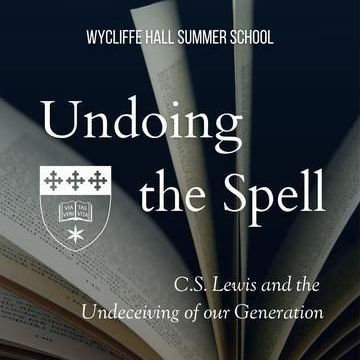A holy Lent and an unholy Bride?
Every day in chapel, one of our students gives a short, 5-minute, sermon on one of the lectionary readings for the day. This reflection was inspired by a reading from John 4, that was then wonderfully preached on by a 3rd year student (though these reflections are my own!).
Where do you go when you’re afraid and want to hide?
- Do you roll over in bed and push ‘snooze’ on your alarm, pull the covers up over your head and pretend the world outside doesn’t exist?
- Do you spend an age and a half perfecting your exterior, so that you can go into the world with the confidence of a well-put together outfit?
- Do you try and be first to ‘go’ when there’s a debate or discussion, weighing in with your well-formed and firmly expressed perspectives, with an unsaid defensiveness that dares others to argue with you?
- Do you shy away from taking risks, preferring to stay on the sidelines of life but envious of the fun being had on-pitch?
The Samaritan woman of John 4 knew about the value of hiding. She hid in plain sight and heat of the midday sun. Like dog-walking in the summer in Houston – collecting water in Samaria was to be done early or late in the day, when the temperature was more bearable and the sun didn’t scorch.
She had a well-planned schedule that kept her off-radar.
But then Jesus came along. And he asks her for a drink of water.
Like so many of us in similar situations, she acts out of her shame. How can Jesus ask such a thing? A Jewish man, asking for water from a Samaritan woman of all things? Like the Parable of the Good Samaritan, such a request crosses enemy lines. This is transgressive. And we haven’t even got to her personal relationship failures yet.
On the face of it, it’s about Jewish-Samaritan dynamics.
But there’s more to it than that. Remember: she’s at the well at lunchtime. He’s come across her right in the place of her hiddenness and shame. And to any well-versed listener of this story, the Jew-Samaritan question would be right up there at the forefront of their mind.
Why? Because Jesus is looking for a bride
The story begins like a hallmark movie. You know the ones where the professional young woman heads to a small town for the holidays. You know what's coming.
A story at a well is a patriarchal meet-cute.
Isaac and Rebecca, Jacob and Rachel, Moses and Zipporah. All of these matches came about through an encounter at a well. And in Isaac’s case, it was an explicit search for someone from the ‘right kind of family’ (i.e. their own tribe).
Here in John 4 we have a well. We have a man. We have a woman. Is she the one? No, she's not. Because she’s a Samaritan woman.
She knows it and she pushes back, protecting herself, but Jesus doesn’t let go. “If you knew the gift of God…” (v.10) he begins. Rather than get caught up in the politics of her question, Jesus says Look at me. Don’t you see?
Something that transcends the entrenched lines that exclude some and brings in others stands before her: “If you knew… you would have asked him, and he would have given you living water.”
Caught up in the weeds
It’s so easy to get caught up in the weeds and focus on who's in and who's out. It’s easy to compare our insides to other people’s outsides and come up wanting. Yet we know the whole story of our lives, but scarcely nothing about other people! And still we see fit to compare, to contrast and to judge. The woman at the well had been on the receiving end of such judgement from her own people who thought they were better than her. So she had taken to hiding out in the beating midday sun to get her work done.
But here's the rub: have you ever tried to stop being judgemental to others or yourself? It’s not easy. It’s like trying to stop thinking about a pink elephant. The more you explicitly try, the more you see pink elephants everywhere.
Instead, may we should look up to the one who says “If you knew… you would have asked him…” Maybe we should worry less about ourselves/others, and remind ourselves of the one who gives living water.
"If we knew the gift of God, and who it is who that is saying to us,'Give me a drink.' we would have asked him, and he would have given us living water."
This is the truth: the bride ain’t pretty.
John 4 reads like a patriarchal meet-cute. But that's not all. This story is on the heels of the wedding at Cana (John 2:1-11) and John the Baptist talking about the Messiah, the bridegroom, being the one who “has the bride” (3:29). The whole thing is about soon-to-happen nuptials.
And the bridegroom did come to look for his bride. He came looking at a well. And who did he choose?
He didn't choose the one you'd think. Not a woman like his mother, Mary, but an excluded, shame-filled, socially rejected Samaritan woman who’d been with many men.
Of course, Jesus didn't marry the Samaritan woman. So why all this marital imagery? Because this is an image of the church that He came to redeem!
Jesus didn’t choose a bride that believed the perfectly put-together exterior she'd fashioned to hide a mess within.
Jesus didn’t choose a bride that had a great and virtuous reputation.
He chose a woman who was an outsider, even to her own people. And choosing one from her own people would have been bad enough!
He chose a bride he would redeem. One who was ashamed yet deserving of love. Broken but ready to be healed.
Desperate, alone and struggling in the heat of the sun.
Maybe that’s why Lent is such a gift
A friend asked me the other day what the purpose of Lent was. I think the answer is somewhere in John 4, because left to my own devices, I can kid myself into thinking I am nothing like the Samaritan woman--nor have I ever been. That I’ve somehow graduated the human condition (spoiler alert: I have not).
God has brought me a long way (and those who have known me longest know how true that is), but each day begins with the acknowledgement that parts of me are still broken and need of healing. Sinful and in need of forgiving. Lost and in need of being found.
Sometimes, I still hide in plain sight. I still can get defensive. I still focus too much on myself and not enough on the One who made me.
I’ve made progress, but perfection is a post-mortem business. The real problem is when I slip into thinking or acting like I've 'made it.'
So may your Lents be a gift where you start to peel back more of your attempts to hide, your inadequacies and your masks.
May your Lents be a journey into more of the real you that needs redeeming.
Because it’s then you’ll be ready (once again) for the bridegroom.
******
Photo by
Sinitta Leunen on
Unsplash
Subscribe to
My Newsletter
Sign up here to receive quarterly updates (and occasional other news blasts) about how ministry is going and our move to the U.K.



